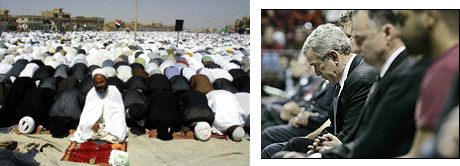
Each day the New York Times has the courage to publish the names of American military personnel killed in Iraq. Today nine names are listed, the youngest at age 18. A Private first class from Paradise, California only found hell in serving his country in a war that even the most diehard (and these young men seem to die all too easily) neocons know cannot be won, only endured until the next election. These soldiers had first names of Shaun, Jesse, Mario, Aaron, Daniel, Joshua, Lucas, Steven and Brandon – a genealogical snapshot of America’s diversity. They grew up in Indiana, Illinois, California, Pennsylvania, Ohio, Minnesota, and Missouri. They could have been studying at a college. But for the names of those dead you would need to flip through the pages to read about the victims of the student rampage massacre at Virginia Tech on Monday.
What do these two lists have in common? In each case young lives were taken and careers ended before they began. Families had to confront the horror of death close to home. There are new scars that will never heal. There are tears that can never stop flowing. There is the nagging question of how could this happen.
And there is irony. One of the victims of the lonely and angry Virginia Tech student was a 75 year-old professor who was a holocaust survivor. It is reported that this elderly man, Liviu Librescu, blocked the doorway to his classroom so his students could escape. His death no doubt kept the toll from climbing even higher.
And there is grief. The coverage of the rampage includes a photograph of President Bush at the convocation held yesterday on the campus. It is fitting that the President should participate in sharing the grief from such an unspeakable act of violence. But there is no nationwide convocation for the nine men who died fighting for a war that President Bush and Vice-President Cheney have made their moment of glory for the history books. As Thomas Friedman laments in his op-ed column today, our two top elected leaders are “more disliked in more places” than any other American presidential team. “They have moral clarity,” observes Friedman, “but no moral authority.” They started a war that has now consumed more than 100 times as many young Americans as the massacre at Virginia Tech.
Unlike the massacre on Monday, which is not likely to be repeated in the near future until the years make it as much an act of history as Columbine, there will be more names of the Iraq War dead in tomorrow’s newspaper. Tomorrow, as usual, I will pick up the paper and go to this list first, wondering if one of the students I have taught is part of this politically tainted sacrifice.
But all these names, important as they are to us as Americans, are dwarfed by the daily deaths of hundreds of Iraqis whose names I will never see reported here. Consider the following assessment of last week’s victims in Iraq:
On Tuesday 10 April 85 civilians are reported dead, 19 of them police recruits blown up by a suicide bomber at a police station in Muqdadiya. A shocking 34 are reported dead in a US/Iraqi raid in Baghdad, while 16 are found bound, tortured and executed in Baghdad, Falluja, Mahaweel and Kirkuk.
On the most peaceful day of the week, 42 die on Wednesday 11 April. The dead include 5 policemen, a mother and her son killed in Mosul, a teacher shot dead in Baghdad, a radio journalist and her husband. Over 30 more bodies are found, while 18 unidentified bodies are buried in Kut.
Over 50 are killed on Thursday 12 April. A suicide truck bomber kills 11 and blows up al-Sarafiya bridge in Baghdad. Up to 8 are reported killed when a bomb explodes in the Iraqi Parliament, inside the Green Zone. Among the dead on Thursday, 3 people killed during a US raid in Haditha and 13 bodies discovered in Baghdad and Kut.
Around 70 more are killed on Friday 13 April. Among the dead, an imam killed with his brother on their way to the mosque in Mosul, a woman and her child blown up by a roadside bomb in Baghdad, 2 interpreters killed in an attack on US soldiers, and over 20 bodies found in Baghdad and Mosul.
Saturday 14 April is the worst day of the week, when around 110 die. A suicide bomber blows up a car at a busy bus station in Karbala, killing 47 civilians, 16 of them children. A further 4 are killed in clashes with the police after the bombing. Another car bomb kills 10 at Jadriya bridge in Baghdad, while police find 28 bodies in Baghdad, Kirkuk, Kut and Mosul.
The week ends with nearly 100 victims of violence on Sunday 15 April, 80 of them in Baghdad. Among the victims 3 children, blown up by car bombs that kill 18 in the Shurta al-Rabia area of Baghdad.
And the killing does not stop. As I started writing this commentary, the news was uploaded on the New York Times website that 127 people have been killed so far today in Iraq.
There is an old philosophical conundrum that muses if a tree falling in the wilderness makes a sound when there is no one around to hear it. I sometimes wonder if the dead really count when we do not hear their names or see their faces. Surely they count as individuals to their families and neighbors, as do the servicemen and Virginia Tech students whose names we do know. But most of us, especially our president, just don’t want to hear. Even God, take your pick but please don’t gloat about his being on “our” side, seems to have lost count.
Daniel Martin Varisco